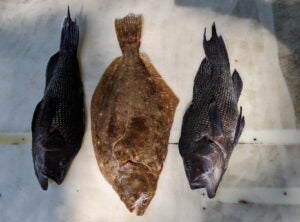Economic Efficiency Assessment of the Rhode Island Fluke and Black Sea Bass Aggregate Management Programs
Title: Economic Efficiency Assessment of the Rhode Island Fluke and Black Sea Bass Aggregate Management Programs
Principal Investigator: Julia Livermore (RI DEM)
Collaborators: Nichole Ares (RI DEM) and Tracey Dalton (URI/RI Sea Grant)
Funding Source: Atlantic Coastal Cooperative Statistics Program
 Summary: For years, discussions on aggregate programs have garnered interest from the Rhode Island fishing community, especially for summer flounder, or fluke (Paralichthys dentatus), and black sea bass (Centropristis striata). With the variability of fish stocks, low quotas and subsequently low possession limits, and rising fuel and vessel maintenance costs, fisheries managers are being asked to provide more flexible fishing operation practices for the fishing industry. In 2019, the Rhode Island Department of Environmental Management Division of Marine Fisheries (DMF) implemented a pilot fluke-black sea bass aggregate program to collect data and assess the efficacy of an aggregate program for these species, where limited participants would be held to a weekly aggregate limit (daily limit, x days open) in lieu of a daily limit.
Summary: For years, discussions on aggregate programs have garnered interest from the Rhode Island fishing community, especially for summer flounder, or fluke (Paralichthys dentatus), and black sea bass (Centropristis striata). With the variability of fish stocks, low quotas and subsequently low possession limits, and rising fuel and vessel maintenance costs, fisheries managers are being asked to provide more flexible fishing operation practices for the fishing industry. In 2019, the Rhode Island Department of Environmental Management Division of Marine Fisheries (DMF) implemented a pilot fluke-black sea bass aggregate program to collect data and assess the efficacy of an aggregate program for these species, where limited participants would be held to a weekly aggregate limit (daily limit, x days open) in lieu of a daily limit.
It was hypothesized that an aggregate program would allow fishermen more flexibility in fishing practices through the utilization of a weekly possession limit instead of a daily limit. Such a program could potentially decrease costs to the fishermen by decreasing days at sea (fuel and vessel maintenance costs decrease) while also increasing safety as fishermen could pick which days are the best in terms of weather. Aggregate programs could also decrease discards, and thus, discard mortality in some fisheries, especially at times when possession limits are low. This study aimed to evaluate these hypotheses by interviewing fishermen participating in the program with varying gear types and operations to collect business information (e.g. fuel, bait, ice, grocery, and labor costs, number of days fished). This data collection provided raw data that does not currently exist, and allowed for assessment of social components of the aggregate programs alongside analyses of the impacts to quota management.
In 2021 and 2022, 15 aggregate program participants were interviewed about their experience in and perception of the program. Based on the interviews conducted, participant perceptions of the pilot aggregate program were overwhelmingly positive, with some neutral comments (i.e., no changes or improvements relative to past fishing activity), and one negative comment (a concern about potential impacts to the summer flounder quota). All interviewees expressed a desire to stay in the program, depending on its future format, but most noted that they simply wanted to see the program continue in some form. A detailed summary of project findings is included in the final project report, available at: https://dem.ri.gov/sites/g/files/xkgbur861/files/2022-08/Pilot_Aggregate_Report.pdf
 Home
Home Browse
Browse Close
Close Events
Events Maps
Maps Email
Email Brightspace
Brightspace eCampus
eCampus


